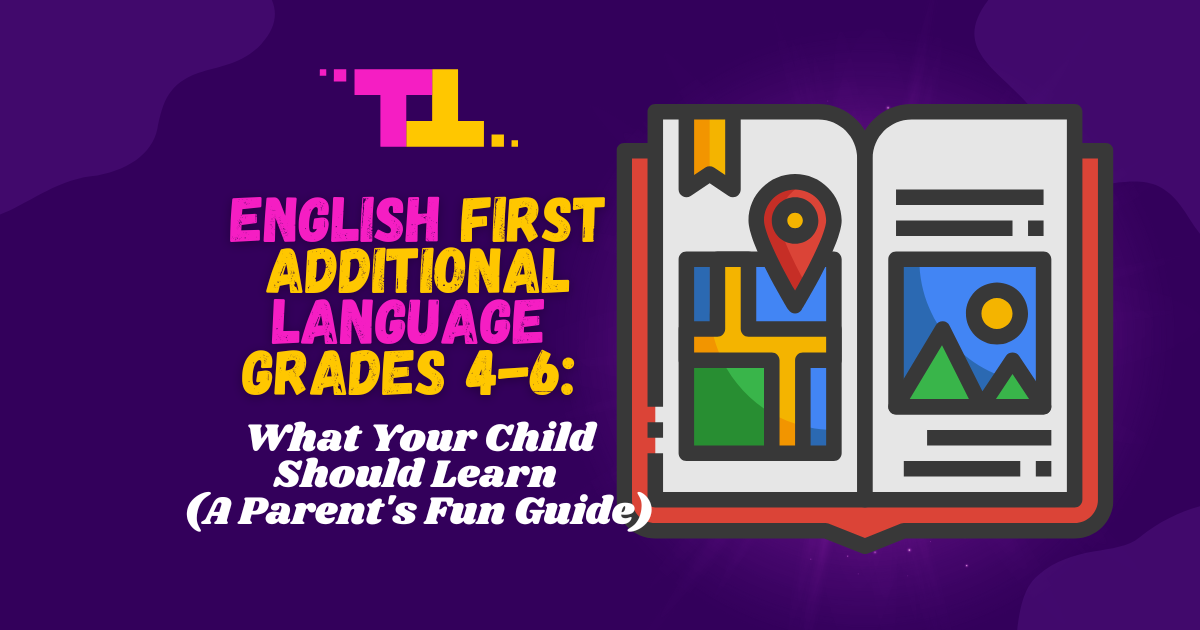English First Additional Language Grades 4-6: What Your Child Should Learn (A Parent’s Fun Guide)

Hello Brave Parents!
Is English making your child (and you) feel like you’re trying to solve a puzzle in the dark? Don’t worry – we’ve got your back! Let’s look at what your young language explorer should be conquering in each grade.
Grade 4: The Beginning of the Adventure
Welcome to the year where your child starts their epic English journey! Think of Grade 4 as Level 1 in a video game – we’re building those basic superpowers.
What Your Grade 4 Hero Should Master:
- Reading Powers
- Read short stories without feeling like it’s Mount Everest
- Find the main idea (like spotting the giant in a “Where’s Waldo?” picture)
- Learn new words (beyond “nice” and “good”)
- Read instructions well enough to maybe, just maybe, help with that new kitchen gadget
- Writing Magic
- Write 4-5 sentences that actually make sense together
- Create short stories (30-40 words) that don’t all end with “and then I woke up”
- Write simple messages that say more than just “OK”
- Use basic punctuation (because dots and commas are not just for decoration)
- Language Tricks
- Know when to use ‘is’ and ‘are’ (the basics of not sounding like a cave person)
- Use simple past tense without time-traveling confusion
- Put words in the right order (because “cat the mat the on sat” is not quite right)
Grade 5: Leveling Up!
Grade 5 is where things get more interesting – like upgrading from a tricycle to a bicycle. Still wobbly sometimes, but now with more speed!
Your Grade 5 Champion Should Be Able To:
- Reading Adventures
- Read longer texts without needing emergency chocolate breaks
- Understand stories well enough to explain them to the family pet
- Find information in texts faster than finding snacks in the kitchen
- Start reading between the lines (yes, there’s meaning hidden there!)
- Writing Powers
- Write paragraphs of 40-50 words (that’s like a very short story, not a novel!)
- Create different types of texts (letters, stories, descriptions)
- Plan their writing (because rushing in like a superhero doesn’t always work)
- Use connecting words (not just “and” and “but” all the time)
- Language Skills
- Use proper tenses (past, present, future – it’s time travel with grammar!)
- Start using interesting words (because everything can’t be “very very good”)
- Master basic punctuation (those little marks are your friends!)
Grade 6: The Pro Level
Grade 6 is where your child becomes a language ninja – still making mistakes, but now with style!
Your Grade 6 Language Warrior Should:
- Reading Mastery
- Handle longer texts without breaking a sweat
- Find hidden meanings like a detective
- Read different types of texts (stories, information, instructions)
- Start having favorites (yes, even in English!)
- Writing Expertise
- Create 50-60 word paragraphs that flow nicely
- Write stories that don’t all involve dragons (unless they really want to)
- Express opinions clearly (beyond just “because I said so”)
- Use proper structure (beginning, middle, end – like a good sandwich)
- Language Ninja Skills
- Use more complex grammar (showing off those skills!)
- Write with style and flair
- Use punctuation like a pro (those semicolons aren’t just winky faces)
Remember:
- Progress isn’t a straight line – it’s more like a dance (two steps forward, one step back, occasional spin)
- Every child moves at their own pace (some are rabbits, some are tortoises – both finish the race)
- Mistakes are not fails – they’re just practice shots
- Reading anything counts (yes, even cereal boxes – we’re not judging)
How FlippedT Helps:
- We make learning fun (because boring is forbidden in our world)
- We explain things clearly (no fancy language gymnastics)
- We celebrate every win (even the tiny ones)
- We’re here when you need us (like your favorite delivery service, but for learning)
Signs of Progress to Watch For:
- Less groaning when English homework appears
- Starting to use English words in daily life
- Attempting to read English outside of school
- Making jokes in English (even bad ones count!)
Need help? Have questions? Want to celebrate a win? We’re here for you – no fancy English required!
Remember: You’re not just helping your child learn English – you’re helping them unlock new worlds. And yes, that deserves another cookie! 🍪
Warmly, Your Partners in Crime at FlippedT
P.S. Feeling overwhelmed? Remember: even English teachers had to start somewhere. And they probably also hid from homework when they were kids! 😉
It’s Not Just Us Saying This Stuff!
Look, we love making the English [Home Language/First Additional Language] curriculum fun at FlippedT, but don’t just take our word for it! Here are some official resources (warning: they’re a bit more… formal than we are):
Parent Tip: Don’t let the official documents overwhelm you – that’s exactly why we’re here! We transform these requirements into engaging, achievable learning adventures for your child. 😊
Note: All links were working at the time of publication. Government websites occasionally reorganise their content, so if you find a broken link, just let us know!
